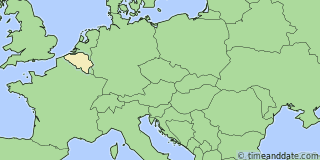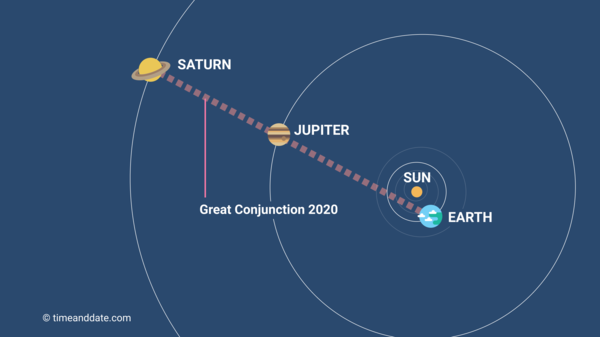May 23: Three Solar System Bodies in Alignment
Venus, the Moon, and Saturn will line up in the sky before sunrise.
Our Interactive Night Sky Map simulates the sky above Brussels. The Moon and planets have been enlarged slightly for clarity. On mobile devices, tap to steer the map by pointing your device at the sky. Need some help?
Tonight's Sky in Brussels, May 25 – May 26, 2025
Mercury rise and set in Brussels
Fairly close to the Sun. Visible only before sunrise and/or after sunset.
Mercury is just 6 degrees from the Sun in the sky, so it is difficult to see.
Mon, May 26 ↑5:27 am
Time:
Altitude: °
Direction: °
Venus rise and set in Brussels
View before sunrise.
Venus can best be seen in the hours just before sunrise. Visibility deteriorates as the sky gets brighter. Venus is visible by day, but may be hard to find.
Mon, May 26 ↑4:07 am
Time:
Altitude: °
Direction: °
Mars rise and set in Brussels
View after sunset.
Mars can best be seen in the hours just after sunset. Visibility improves as the sunlight fades.
Mon, May 26 ↓2:22 am
Time:
Altitude: °
Direction: °
Jupiter rise and set in Brussels
View just after sunset.
Jupiter is close to the Sun and can only be seen shortly after sunset. Try finding a good, unobstructed view of the horizon.
Sun, May 25 ↓11:24 pm
Time:
Altitude: °
Direction: °
Saturn rise and set in Brussels
View before sunrise.
Saturn can best be seen in the hours just before sunrise. Visibility deteriorates as the sky gets brighter.
Mon, May 26 ↑3:36 am
Time:
Altitude: °
Direction: °
Uranus rise and set in Brussels
Very close to Sun, hard or impossible to see.
Uranus is just 7 degrees from the Sun in the sky, so it is difficult or impossible to see it.
Mon, May 26 ↑5:21 am
Time:
Altitude: °
Direction: °
Neptune rise and set in Brussels
View before sunrise. Use binoculars.
Neptune can best be seen in the hours just before sunrise. Visibility deteriorates as the sky gets brighter. Very faint, use binoculars.
Mon, May 26 ↑3:34 am
Time:
Altitude: °
Direction: °
Planets Visible in Brussels
| Planetrise/Planetset, Sun, May 25, 2025 | ||||
|---|---|---|---|---|
| Planet | Rise | Set | Meridian | Comment |
| Mercury | Mon 5:27 am | Mon 9:15 pm | Mon 1:20 pm | Difficult to see |
| Venus | Mon 4:07 am | Mon 5:11 pm | Mon 10:38 am | Great visibility |
| Mars | Sun 11:19 am | Mon 2:22 am | Sun 6:51 pm | Average visibility |
| Jupiter | Sun 7:03 am | Sun 11:24 pm | Sun 3:14 pm | Average visibility |
| Saturn | Mon 3:36 am | Mon 3:23 pm | Mon 9:29 am | Average visibility |
| Uranus | Mon 5:21 am | Mon 8:53 pm | Mon 1:07 pm | Extremely difficult to see |
| Neptune | Mon 3:34 am | Mon 3:34 pm | Mon 9:34 am | Very difficult to see |













